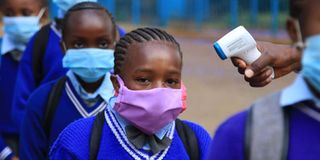How schools will recover lost time in new calendar

Teachers check temperatures on pupils at Nyamachaki Primary School in Nyeri County on October 12, 2020.
What you need to know:
- The ministry also plans to fit the 2021 academic year in seven months from May to December.
- Prof Magoha asked teachers to embrace the new calendar and ensure they cover the syllabus on time.
- The revised calendar will see teachers engage learners in class for longer hours.
Learners are staring at stretched lessons, long school days and extended weeks as the government embarks on a crash programme to normalise the national academic calendar.
The learners — Grade 4, Standard 8 and Form 4 candidates — who resumed classes yesterday, will be expected to report to school early and leave later than usual, with a possibility of having classes on Saturdays.
This is after Education ministry and the Teachers Service Commission advised teachers to be “innovative” to recover the seven months, which learners lost to Covid-19.
11-week calendar
In the rushed programme, Education Cabinet Secretary George Magoha last week issued an 11-week school calendar for both second and third terms, allowing phased reopening that began yesterday.
The ministry also plans to fit the 2021 academic year in seven months from May to December, allowing the school calendar to resume to its traditional January-December time frame from 2022.
Yesterday, Prof Magoha asked teachers to embrace the new calendar and ensure they cover the syllabus on time.
Recover lost months
“We’re confident that they will work on a crash programme to recover the lost months,” the CS said. He directed teachers to resume coverage of syllabus from where they left in March and give proper guidance to learners who missed online classes.
The decision to compress the school calendar was advised by the Education Taskforce Committee on Covid-19.

In their discussions, which are detailed in a report, the stakeholders felt that if the calendar was not crashed, many learners would outgrow their school-going years.
Monitor situation
Prof Magoha said the ministry would monitor the situation in schools within one or two weeks before recalling the other classes.
“The ministry will observe the situation in one or two weeks, then we recall the other children. We shall recall them when the time is right,” he said after leading inspection at Nairobi Primary and Olympic Primary schools.
The revised calendar will see teachers engage learners in class for longer hours. In December, learners will only break for one week, from December 24 to January 4, after which they will report back for third term.
Usually, learners used to break for their end-of-year long holidays from end of October till January.
Students and pupils have also been enjoying a one-month break after first term in April and after second term in August.
Before the pandemic, first and second terms were running for 14 weeks while third term lasted 10 weeks, allowing Standard Eight and Form Four candidates to sit national exams in October and November respectively.
The learners were also going for half terms mid-February and mid-June during first and second terms.
However, with the new revised calendar, learners will not have the half-term second-term break.
Must be ‘protected’
The school holidays will also be reduced to one or two weeks.
Prof Magoha also ruled out any possibility of school visits, saying, children must be “protected”.
In the new plan, all learners will move to the next class in June next year. Those in Standard Eight will join Form One in June 2021 while those in Form Four will join colleges and universities from September.
Prof Magoha said that schools have to meet the health protocols to ensure learning goes on uninterrupted.
“Although possible distancing shall remain a challenge, it shouldn’t not be a bottleneck to our resolve to reopen schools,” he said.
The CS asked schools to work with health centres in case of an emergency. “Schools shall maintain a biodata of all students should there be an emergency,”
Both Kenya National Union of Teachers Secretary-General Wilson Sossion, and his Kenya Union of Post Primary Teachers counterpart, Mr Akelo Misori, asked teachers to embrace the new school calendar and work hard to make up for the lost time.





